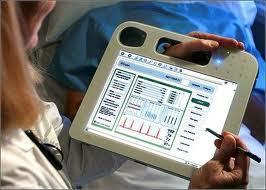por
Brendon Nafziger, DOTmed News Associate Editor | June 22, 2012
IBM’s silicon trivia champ Watson is expected to do big things in medicine. Dr. Eliot Siegel, a radiologist who oversaw the first all-hospital PACs transition in the early 1990s, is working with IBM on Watson, and said the computer technology now has knowledge analogous to a “well-read medical student.” But he wants it to get smarter, and he thinks the technology might one day be able to help radiologists prepare for image interpretation and even, potentially, help with diagnosis and treatment. This is part two of our interview with Siegel. For part one on next-generation PACS, go
here.
DBMN: I know you'd like to set up a Center for Computational Intelligence in Medicine at the University of Maryland -- how far along has that gotten?
SIEGEL: The center hasn't gotten very far because we're still trying to figure out whether the center should be centered in the school of medicine, or whether it should be on campus here, which is the professional campus, which would encompass pharmacy and nursing informatics and medicine, and potentially even law and dentistry. And so we're still trying to set that up administratively. But in the meantime, we've been working with the University of Maryland, the Baltimore city campus, and we've continued our talks with IBM and a number of different groups.



Ad Statistics
Times Displayed: 124471
Times Visited: 7225 MIT labs, experts in Multi-Vendor component level repair of: MRI Coils, RF amplifiers, Gradient Amplifiers Contrast Media Injectors. System repairs, sub-assembly repairs, component level repairs, refurbish/calibrate. info@mitlabsusa.com/+1 (305) 470-8013
We're making slow but sure progress, trying to make it multi-campus and working to include not only the medical school but other schools on campus such as pharmacy and nursing and also to have it encompass the excellent computational resources and expertise at the University of Maryland undergraduate campuses.
Why is "computational intelligence" needed?
If you look at how hospital information systems communicate today and how they integrate, it's really amazingly limited. We're just in the nursery school stage of beginning to get our information into a digital format and starting to look at using existing standards to help with interoperability and making the record computer intelligible. Once we do that we can build intelligent clinical systems that can sort through the complex health record and recognize safety issues such as drug interactions and inaccurate or incorrect medications, become more effective by allowing automation of implementation of medical guidelines, and become more efficient by allow the computer to help synthesize and distill and interpret important clinical data.
Speaking of Watson, you've done some work with it...

